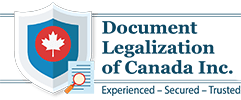How to Prepare Your Documents for Apostille
You might be asked for an apostille on your business or personal documents in a variety of situations. In the end, a certain procedure must be followed in order to acquire the proper signatures and stamps on a document that is intended to be used in another country.
As per the provisions of The Hague Apostille Convention, signatory nations are obligated to acknowledge public papers issued by other signatory nations, as long as those documents bear the globally recognized apostille as an authentication form. Apostilles guarantee that official documents issued in one signatory nation will be accepted as legitimate and lawful in every other signatory nation.
The document you have is not from Canada
An apostille certificate from the country of origin or legalization by the relevant diplomatic mission in the country of origin are required for documents that were not issued in Canada.
The document may be granted an apostille certificate by the country of origin if both the destination country and the country of origin have ratified the agreement.
The typical procedure is authentication by the Ministry of Foreign Affairs in the country of origin, followed by legalization at the destination country’s diplomatic representation, if the destination country is not a signatory to the convention.
The document you have is issued from Canada
An apostille cannot be obtained for Canadian documents because Canada is not a party to the Hague Convention. In order for Canadian documents to be accepted abroad, they need to go through an authentication and legalization procedure.
Authenticating your documents at Global Affairs Canada (JLAC) is the first step in the authentication and legalization procedure. The diplomatic mission of the nation you are visiting must then legalize them.
The legalization and authentication of Canadian documents must meet very strict guidelines set forth by the Department of Foreign Affairs – (JLAC) and every foreign diplomatic mission based in Ottawa. The process is less stressful and takes few weeks to complete when Document Legalization of Canada apostille service is used. Feel free to contact our accredited apostille specialist at 1-833-700-5342 or by filling the below form.







Recent Comments